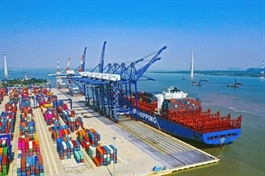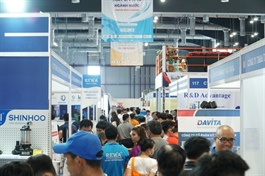Smart logistics key for competitiveness improvement: experts
Smart logistics key for competitiveness improvement: experts
To meet the demand of domestic trading and import-export activities, the logistics sector is working towards professional and competitive services meeting international standards, in which smart logistics development is considered the key solution.

A Vietnam Post bonded warehouse. Local logistics firms have been increasingly aware of the need to speed up digital transformation and apply technology to their business operations— Photo courtesy of the company |
According to Director of the Import-Export Department under the Ministry of Industry and Trade Phan Van Chinh, local logistics firms have been increasingly aware of the need to speed up digital transformation and apply technology to their business operations, aiming to cut cost and increase competitiveness.
Supply chain director at Nestle Vietnam Nguyen Tran Hoang Yen said that digitalisation has helped the firm better connect with the global market and optimise goods transport and distribution activities in the domestic market.
Nestle has launched its Cargoo app to connect manufacturers, importers and shipping lines, enabling them to follow the transportation process of each order and track the goods information, book ships and manage all related documents, she said.
Meanwhile, Marketing Director of the Saigon Newport Corporation Truong Tan Loc said that the firm has launched a system of e-port and e-warehouse, while applying artificial intelligence (AI) in customer services, thus improving its service quality.
However, as 90 per cent of the logistic firms are small- and medium-sized enterprises, the application of smart logistics has remained limited.
Pointing to major barriers hindering smart logistics development in Viet Nam, Vice Chairman of the Viet Nam Logistics Business Association Le Quang Trung mentioned limitations in mindset and confusion in selecting suitable technologies as well as a shortage in financial and human resources and a lack of harmonious policies for digital transformation.
Experts held that strengthening the application of IT and modernising management and operation methods as well as using logistics optimising platforms are among the effective measures to reduce logistics cost and improve service quality.
Loc said that domestic logistics firms should work closely together to enhance the competitiveness of Viet Nam’s logistics sector by building a shared database on Viet Nam seaport system with connections with other ports in the region and the world.
At the same time, the State and localities should further simplify administrative procedures, while building a joint database and processing administrative procedures online, he said, stressing the need for updating the legal system to encourage businesses to develop new services and technologies.
Director of Northern Operations Division at Lazada Viet Nam Nguyen Trieu Quang Quang said that logistics businesses should standardise their processes and build a sustainable ecosystem to grasp opportunities from the booming e-commerce, while improving the delivery experience from every touchpoint.
Vice Director of the Import-Export Department under the Ministry of Industry and Trade Tran Thanh Hai underlined the need for coordination and strong linkage among not only logistics firms but also all relevant agencies in order to successfully promote the application of digital technology.


























